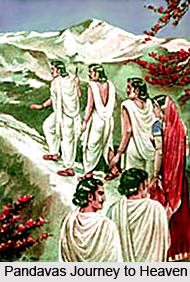 Svargarohana Parva is the eighteenth Parva of Mahabharata and it is also considered to be the last episode of the great Hindu epic. This episode is also known as the `Book of the Ascent to Heaven`. It deals with the final test of Yudhisthir and the return of the Pandavas to the spiritual world. From among the eighteen Parvas or episodes of the epic of Mahabharata, the Svargarohana Parva reveals the true character of Yudhishtir. This Parva narrates the tale of the renunciation of the throne of Hastinapur by Yudhisthir and his journey all over the country with his wife and his brothers before the final journey to heaven. However, Sahadeva, Nakula, Draupadi, Arjuna and Bhima fell down and died in their way towards heaven for the weight of their sin and Yudhisthir alone, accompanied by a dog moved further towards heaven.
Svargarohana Parva is the eighteenth Parva of Mahabharata and it is also considered to be the last episode of the great Hindu epic. This episode is also known as the `Book of the Ascent to Heaven`. It deals with the final test of Yudhisthir and the return of the Pandavas to the spiritual world. From among the eighteen Parvas or episodes of the epic of Mahabharata, the Svargarohana Parva reveals the true character of Yudhishtir. This Parva narrates the tale of the renunciation of the throne of Hastinapur by Yudhisthir and his journey all over the country with his wife and his brothers before the final journey to heaven. However, Sahadeva, Nakula, Draupadi, Arjuna and Bhima fell down and died in their way towards heaven for the weight of their sin and Yudhisthir alone, accompanied by a dog moved further towards heaven.
With the onset of Kali Yuga and after the news of the death of Lord Krishna and his brother Balarama along with their entire race reached Yudhisthir, he understood that the time had come for the departure of the Pandavas and Draupadi for the heavenly abode. Thus Yudhishtir and his brothers retired, leaving the throne to their only descendant Parikshit, who survived the battle at Kurukshetra. Abandoning all their belongings and ties the Pandavas started their final pilgrimage in the Himalayas. Then the fall of Draupadi and the other four Pandavas except Yudhisthir, while climbing the peaks is described in this episode.
Yudhisthir and His Dog
When Yudhisthir was moving further with the dog after the fall of his four brothers and his wife Draupadi far behind, then Lord Indra, King of Gods, arrived to take him to the heaven in his Golden Chariot. But Yudhisthir desired to carry the dog with him to heaven since that creature accompanied him in all his good and bad times. But Indra objected to the wish of Yudhisthir and asked him to leave behind the dog. The son of Kunti stepped back and refused to leave behind the dog which was under his protection. Indra was greatly surprised at the behaviour of Yudhisthir. This Parva gives an account of the various questions asked by Indra regarding Yudhisthir`s not arranging proper cremations for his own brothers. Yudhisthir told to Indra that he would prefer not to go to heaven if the dog which he was accompanying was not allowed to be taken to the heaven. After hearing those words from Yudhisthir, the dog came to its original shape. The dog was Dharma itself and thus Yudhisthir; the righteous Pandava passed the test.
Yudhisthir entered heaven with the mortal form and there he saw his enemies. He saw those who fought against him in the great battle at Kurukshetra. He did not find his virtuous brothers or his wife Draupadi. Instead he came across Duryodhana and his evil allies. This Parva narrates that the four Pandavas and Draupadi were put into hell or Naraka because of their little sins and while Duryodhana was in heaven since he died at the blessed place of Kurukshetra. This episode also describes the life experienced by the four Pandavas and Draupadi in the hell. Thus, after seeing the plight of his brothers and his wife, the soul of Yudhisthir was mightily offended. After seeing his enemies enjoying in the Heaven, Yudhisthir ordered his guide to lead him to some other place. Then he heard the voice of his own people in Hell and turning towards the messenger, who had not yet left him, he asked him to take leave and also told him to inform the gods that he would stay with his brothers and his wife and his own people in Hell and would never return to Heaven where his enemies lived.
After getting orders from Yudhisthir, the messenger left the place and Yudhisthir remained alone, with head sunk on his breast, brooding in Hell on the fate of all the persons whom he loved. After a short period, and immediately the scene was changed and the sky above them became bright with the blowing of sweet air. Everything that was repulsive and foul disappeared. Then Yudhisthir looked up to find that he was surrounded by the gods who told him that his test was passed and he had reached heaven once more and there his brothers and his wife Draupadi was also present. Yudhisthir had to spend some time in Hell to test him and enable him to atone for his sin of using deceit to kill Dronacharya. The Svargarohana Parva of Mahabharata enhances the honest quality of Yudhishtir for his dharma and the final defining moment of the epic is the instance of divinity bowing down to humanity.



















